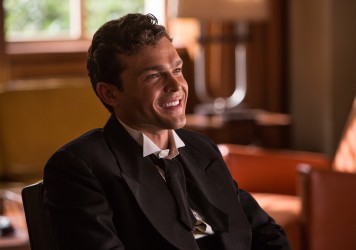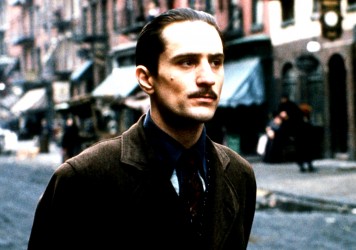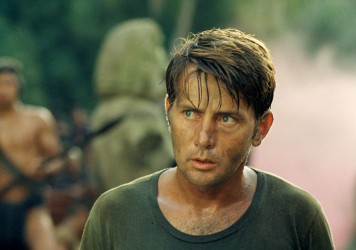Tetro may echo the themes of Francis Ford Coppola’s past masterpieces, but this is the return of an artist, not a legend.
A banner draped across an Argentine street is illuminated by lamplight. ‘The wind sweeps the road,’ it reads, ‘you cannot go back.’ It is a sentiment that will come to haunt Angelo and Bennie Tetrocini as they learn to put aside the bitter memories of the past and embrace their future. But like so much in Francis Ford Coppola’s Tetro, these words are resonant in the life of the director himself.
At times it has felt as though Coppola will never be allowed to escape his past. A giant of American cinema, he has become enshrined and entombed in history, carrying the burden of genius for almost four decades.
He was 33-years-old in 1972. By the time he turned 40, he had changed the shape of American filmmaking. In less than a decade he produced four of the defining works of New Hollywood: The Godfather and its sequel, The Conversation and Apocalypse Now. Intelligent, innovative and audacious, each too was united by an unflinching commitment to the art of cinema, a reckless passion that took their director to the brink, and then beyond.
These were the years of accumulation – of knowledge and experience, of reputation, mythology, power and wealth. Of an iconic status within the canon of American film that both insulated and enervated Coppola in the years that followed.
As excess exhausted the appetite, Coppola became a self-inflicted casualty in the war between art and commerce. Creatively bereft and financially bankrupt, by the early ’90s he was no more than a studio stiff for hire – a saccharine comedy here, a legal pot-boiler there – until finally entering unofficial retirement.
At 71, Coppola has undergone a long and necessary transformation – a period of divestment to offset the greedy acquisitiveness of success. The name, of course, remains and with it the shards of memory and reputation that connect him to the past. But as the director returns to filmmaking for only the second time in a decade, there is much that has been left behind.
The young man’s conceit has been replaced with a more modest ambition; to return to the personal filmmaking of his roots, to the intimacy of The Rain People, made in 1969, when he was still a filmmaker rather than a legend. Coppola shot that film from the back of a van – a mobile film studio that demanded innovation and flexibility. Now he’s re-embracing that ethos of creative freedom, stripping away the complexity of the process in an effort to recapture something real.
And in doing so, in doing what other filmmakers of his generation have promised but never delivered, in rejecting the demands of success and the tethers of expectation, Coppola has been, if not re-born, then re-energised – seduced once more by the romantic possibility of cinema.
The result is Tetro, his first original screenplay since The Conversation – a poetic drama that evokes the great themes of family, rivalry, deceit and betrayal but in a style and on a canvas far removed from the director’s earlier epic work. Tetro is Coppola’s best film in a generation – low on budget, high on ideas, stylistically bold and thematically rich.
With its three-act structure and narrative drive, Tetro may not be an art film per se, but with a delicacy of construction that belies powerful undercurrents of crisis and tragedy, it is evidence that a cinematic artist has finally returned to work – somewhat ring-rusty though he may be.
In the film’s opening image a moth is attracted irresistibly to light, establishing a current of inexorable self-destruction that will illuminate the film as haunted writer Angelo Tetrocini (Vincent Gallo) – a ‘genius without the accomplishments’ – struggles to reconcile himself to the betrayals of his family.
The progeny of artists – his father is the great composer Carlo Tetrocini; his mother an opera singer and famous beauty killed in a car accident with her son at the wheel – Tetro has crossed the world to escape his past, fetching up in an Argentine asylum, his unpublished life story clutched to his chest.
But the story lacks an ending, one that will be provided by his half-brother, Bennie (Alden Ehrenreich), who has come to Buenos Aires to confront the sibling who abandoned him and fill in the blanks that have disrupted the narrative of his own life.
Bennie finds Tetro living with his girlfriend, Miranda (Maribel Verdú), in a small apartment in a bohemian quarter of the city. Here Tetro has carved a reputation as an unruly writer; the kind of man who will start a fight over the question of whether language is dead. Tetro is a wounded animal hobbling on a crutch, but where the cast on his leg will be removed, Bennie’s visit reopens emotional fissures that will take longer to heal.
And as Bennie delves into the secrets of his brother’s life and work, he too will be left irrevocably changed by the experience, even as he unlocks his own creative voice and offers Tetro an ending to both their stories.
This dynamic – the shared journey of a sophisticate and an innocent – may echo The Rain People, but Tetro is a more intriguing and stylised piece of work. Shooting in gorgeous shades of liquid black and white, cinematographer Mihai Malaimare Jr amplifies the romance and poetry of the South American landscapes, from the street-front cafés of Buenos Aires to the mountainous backdrop of Patagonia.
It is Coppola’s first film in monochrome since 1983’s Rumble Fish, another story about brothers and family secrets. But where that film had a muscular texture, the high-contrast photography of Tetro – influenced by the work of Antonioni and Kurosawa – is more poignantly beautiful and atmospheric. Indeed, the film is more successful as a mood piece than a drama, with its stunning compositions that capture the spirit of the city.
Coppola’s boldest gambit sees the film switch to colour at key moments, where, as the emotional drama crescendos, the traditional language of cinema fails, just as words have deserted Tetro at the climax of his play. Instead, inspired by Powell and Pressburger’s The Red Shoes and The Tales of Hoffman, Coppola segues into an impressionistic ballet to create a cinema of pure spectacle.
This collision between the archaic and the cutting-edge (the ballets are enhanced by visual effects) sees the director engaged in establishing a new kind of experience, a ‘total cinema’ in which different forms of inspiration – literature, art, theatre, music – come together to articulate a singular extraordinary vision.
There is, of course, an extra frisson in a film of Coppola’s that tackles the themes of family, rivalry and genius. Tetro speaks to the director’s own biography – his father was an award-winning composer and musician; his mother an actress – but it is now Coppola himself who is the dominant figure with an extended family of artists.
Or perhaps that paternal figure is the director’s dialogue with his former self. It is, after all, his own reputation, not his father’s, that now haunts Coppola’s every move – his own past that is the domineering force from which he’s seeking to escape.
Accordingly, while Tetro is a film of great passions, it is surely a more sympathetic and reflective work than he would or could have made as a rebellious adolescent. Tellingly, when the brothers’ secret is revealed, it is Tetro’s regret, sadness and forgiveness that linger, rather than Bennie’s rage and bitterness.
It is not only Coppola’s history that is entwined with the film. Vincent Gallo brings a brooding vulnerability to the role of Tetro, rooted in his own image as the enfant terrible of Hollywood. He approaches the part without irony but gives free reign to that seductive spark of volatility. Framed by angular planes of black and white light, Gallo seems every inch the romantic rebel, the uncompromising visionary whose outbursts of passion are the stuff of legend.
In contrast, Alden Ehrenreich is the film’s fresh face, a blank canvas on which Tetro – and Coppola – has indelibly imprinted his mark. This is an extraordinary debut from a 20-year-old who holds the screen like a born star. Ehrenreich is the perfect foil for Gallo, offsetting his co-star’s piercing intensity with sleepy-eyed beauty. With his boyish looks and magnetic charisma, Ehrenreich will draw justifiable comparisons to a young Leonardo DiCaprio, but in Coppola’s smoky black-and-white bohemia, James Dean seems the more resonant touchstone.
Of course there are flaws. Tetro is caught somewhere between pure art film and straight drama, without going far enough in either direction to succeed entirely. The final act might charitably be described as ‘operatic’ in its intensity, though ‘melodramatic’ would fit the bill equally well. In fact, you could take a pair of scissors to a good portion of the last half-hour and re-shape it into something that felt truer to the tone of the film’s first half.
But any disappointments need to be taken in context. Coppola is one of a generation of directors who came of age in the 1970s. They dreamed of re-making Hollywood in their own image, with small-scale art films and personal visions. They succeeded in ways they could never have predicted, but it was that very success that took them away from the films they wanted to make.
Today, while Scorsese retreats into genre, while Lucas plays digital games on the Skywalker Ranch, while Friedkin and Bogdanovich fade away, Coppola is here, now, making the kind of film he believes in. Maybe if the other Movie Brats followed him they’d make a better film than Tetro. But they’re not, and they won’t. Coppola can hold his head up. Because though you might not love the film he has made, you have to love the fact that he made it.
Published 24 Jun 2010
Coppola is the legend who almost disappeared. Any new film of his is cause for excitement, but also perhaps for trepidation.
A film of stunning visuals and grand themes that sags slightly at key dramatic points. It may not be a masterpiece, but it is clearly the work of an impassioned artist.
Coppola has returned with an uncompromising artistic voice. Tetro is worth a thousand of the films that most of his contemporaries are producing.

The Hail, Caesar! star reveals how the writer/director pair put him at ease on the set of their latest triumph.

Francis Ford Coppola’s magnum opus gets a big screen outing, see it if only to be able to understand The Simpsons better.

A jaw-dropping spectacle and brain-melting existential nightmare, Francis Ford Coppola’s Vietnam opus is touched by genius.